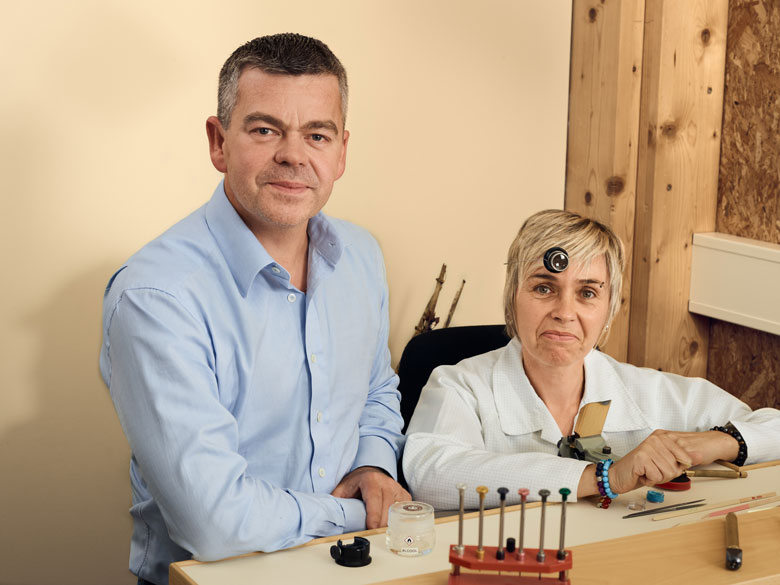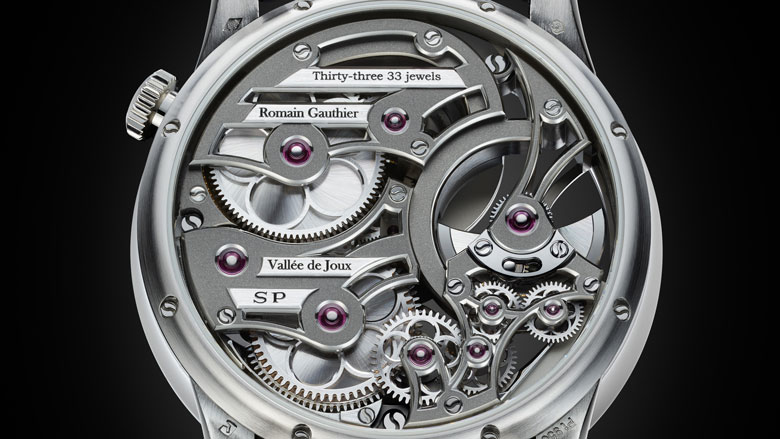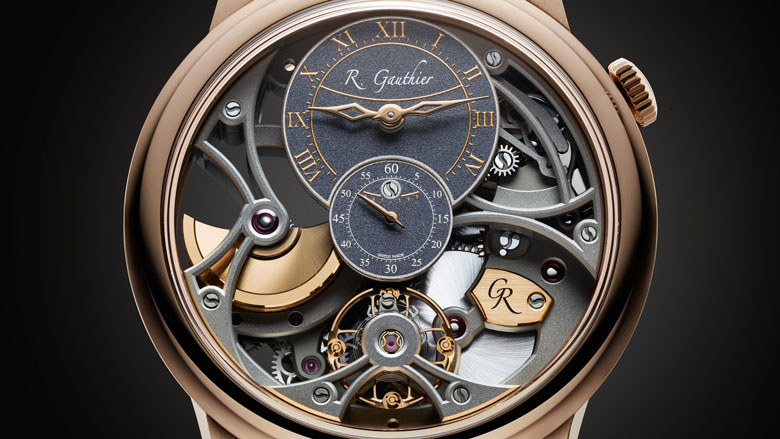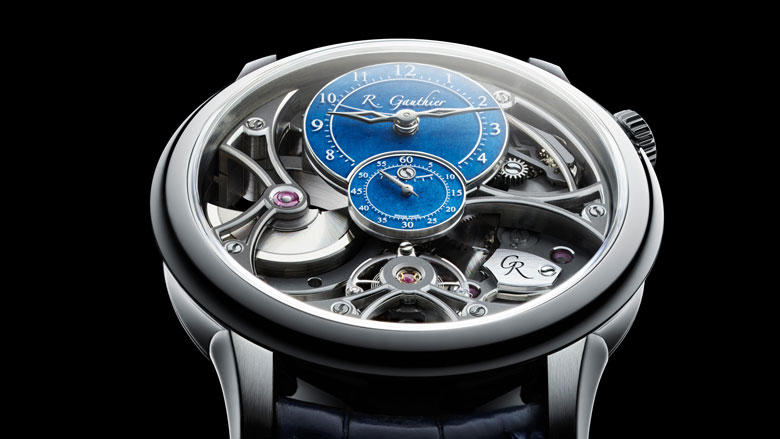
Romain Gauthier Celebrates 15 Years with Insight Micro-Rotor Skeleton
This year marks the 15th anniversary of Romain Gauthier. It is fitting, then, that the Swiss watchmaker’s latest creation, Insight Micro-Rotor Squelette, calls on an area of craftsmanship for which he and his team have been heralded since the birth of the brand in 2005: hand-finishing.
By opening up and stripping down his high-end, time-only automatic caliber, Romain has created a truly contemporary skeleton watch that is a technical and artistic tour de force. Not only do the skeletonized, ultra-light natural titanium bridges and mainplate help to reveal the mesmerizing mechanics of the in-house movement, they also provide the perfect platform for the Romain Gauthier anglage specialists to demonstrate their immense skills. For each Insight Micro-Rotor Squelette movement features as many as 250 hours devoted to anglage alone, that’s to say the beveling, softening, smoothing and polishing by hand of the bridges and mainplate, in an extraordinary demonstration of watchmaking artistry.
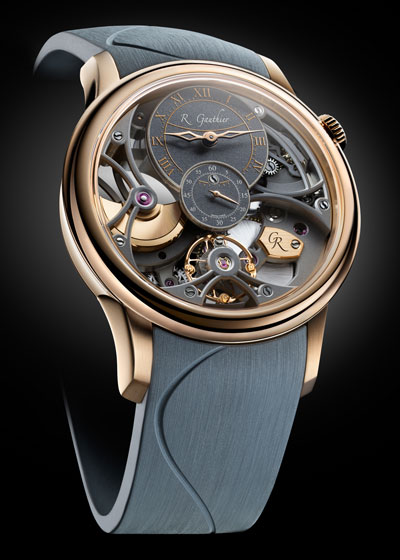
Skeletonizing Insight Micro-Rotor: For either technical or aesthetic reasons, not every caliber lends itself to skeletonization, and Romain Gauthier’s in-house movements are no different. “If you skeletonized my first movement Prestige HM/HMS, there would be sizeable voids leaving little to see except the hair on your wrist, and that’s not ideal,” says Gauthier. “The open architecture of my Logical One means that if you opened it up even more, you wouldn’t necessarily be able to view more of the mechanics than what you can already see. However, my Insight Micro-Rotor jumps out as a natural fit for skeletonization.”
Insight Micro-Rotor is Romain Gauthier’s high-end, automatic timepiece of which the hour, minute and small second indications are powered by an in-house caliber boasting a bi-directional micro-rotor made from 22-karat solid gold. Visible dial side and through the display back, this oscillating weight turns smoothly between two bridges, each fitted with a friction-minimizing, wear-resistant ruby bearing. In whichever direction the micro-rotor swings, it winds a serially operating double mainspring barrel offering 80 hours of power at full wind. For Gauthier, the architecture of the arcing bridges, the position of the balance and micro-rotor, and the layout of the gears and barrels meant skeletonizing this movement would really add something.
He says: “As I worked on the design and explored potential executions, it became clear that skeletonizing Insight Micro-Rotor would not leave awkward gaps, but would instead reveal previously hidden details and create new ones, making this movement even more expressive.”
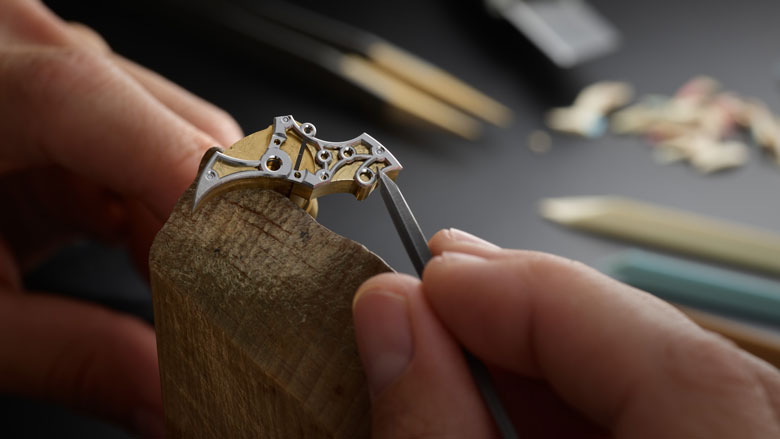
Material Decisions: Romain’s design for opening up the Insight Micro-Rotor entailed skeletonizing the mainplate and eight bridges that, until now, have been made in solid brass. At the thicknesses he envisaged, going as thin as 0.7mm, skeletonized brass bridges wouldn’t have necessarily held up. Grade 5 titanium, however, offered the requisite strength and a lightness that could reduce the overall weight of the movement to 15.95g, the ability to look good naturally without the need for galvanic deposition, and the ability to be hand-polished. All the same, machining titanium has its challenges.
“Titanium takes longer than brass to machine the material into the required shape. Progress is slower and more incremental, with more steps required for each piece,” says Gauthier. “It wears down tools and can break them more easily. There is always a risk of fire, so you must avoid unmonitored machining during the night. And it also tests the machine operators’ ability to work within +/- 2-micron tolerances because if any holes are a fraction too small, the jewels could break when the watchmakers drive them in.”
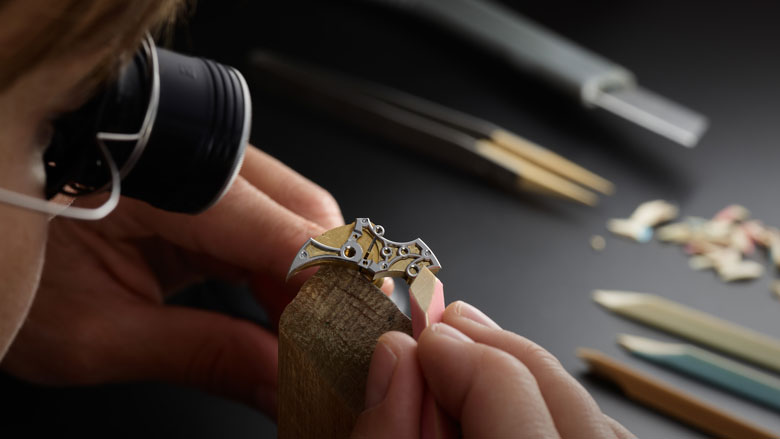
Off-the-Scale Hand-Finishing: If machining the titanium mainplate and bridges of Insight Micro-Rotor Squelette has its challenges, they pale in comparison to the challenges of hand-finishing them. For this skeletonized movement calls on a particular savoir-faire for which Romain and his team have garnered plenty of plaudits since the brand was founded in 2005: anglage, or the art of beveling, softening, smoothing and polishing components by hand.
Put simply, anglage beautifies the component by creating a polished bevel between its surface and its flanks, one which catches the light and the eye. The angleur or angleuse creates a bevel using a steel file, then softens and smooths the material, first with degussit stone then using a series of buffs with emery-paper tip gradually going from a coarser to a finer grain, before polishing the bevel using the woody stem of the locally-growing gentian plant with diamond paste. It requires skill, experience and patience, and even relatively simply shaped bridges made in brass can each take tens of hours to bevel, soften, smooth and polish by hand.
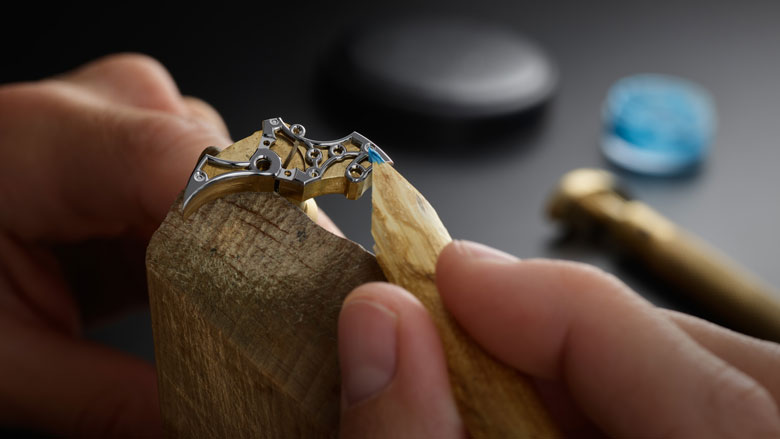
As you can imagine, the skeletonized mainplate and bridges of the Insight Micro-Rotor Squelette tested the talents of the Romain Gauthier anglage team on an entirely new level. One thing was the complexity of the shapes created by the skeletonization, featuring no fewer than 156 sharp, internal angles that make it tricky for these artisans to access with their handheld tools, while limiting the scope of movement that their hands can make. Another thing was the way in which the titanium behaves.
“In all my 17 years as an angleuse, I have never worked on a movement consisting of so much titanium,“ says Sylvie Devaux, Head of Anglage at Manufacture Romain Gauthier. “I’ve worked on brass, steel, gold and German silver components and am even used to working on the titanium constant-force bridge of Romain’s Logical One, which takes a good 20 hours to finish by hand. But Insight Micro-Rotor Squelette is another proposition for me and my team.
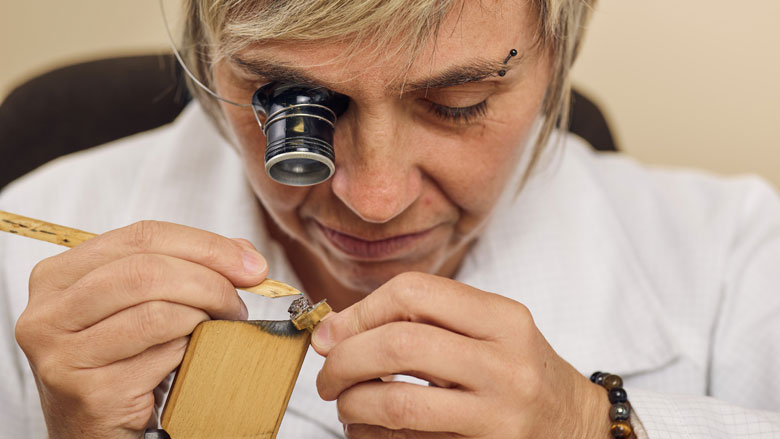
“The same properties that make titanium a challenge to machine also make it extremely difficult to hand-finish. Each of the beveling, softening, smoothing and polishing stages take far longer than working with brass. You have to repeat steps, sometimes twice. Titanium tends to stick to our anglage tools, and we have to keep trimming the ends of the buffs and gentian so they stay effective. You also sometimes come across micro-grains in the titanium that detach, leaving tiny spots. The only solution is to go back over the angle all again.”
Indeed, it takes one Romain Gauthier anglage specialist no fewer than 250 hours to bevel, soften, smooth and polish by hand the natural titanium mainplate and eight bridges needed for one Insight Micro-Rotor Squelette.
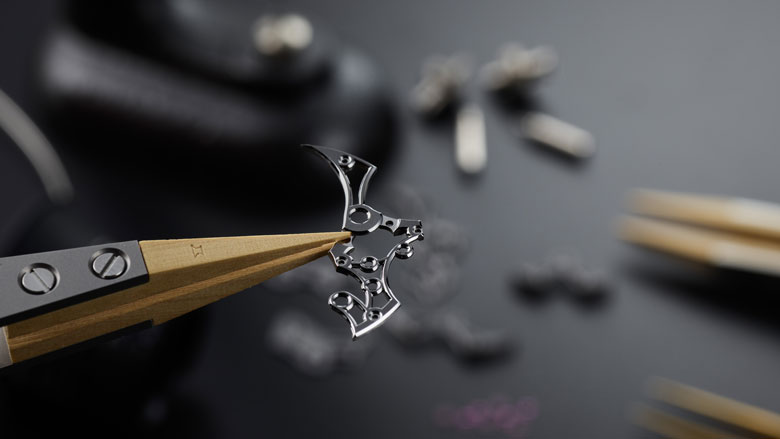
And that’s not even counting the time it takes Sylvie and her team to carry out other decorative techniques applied by hand to these components, such as polishing the screw and jewel countersinks using an ebony spindle, satin-finishing the flanks and hand-frosting the flat surfaces.
In fact, when you add up all the hours devoted to decorating the entire movement by hand or by hand-operated tools – including anglage, hand-frosting, polishing countersinks, circular graining, straight graining and snailing – it comes to over 350 hours of work!
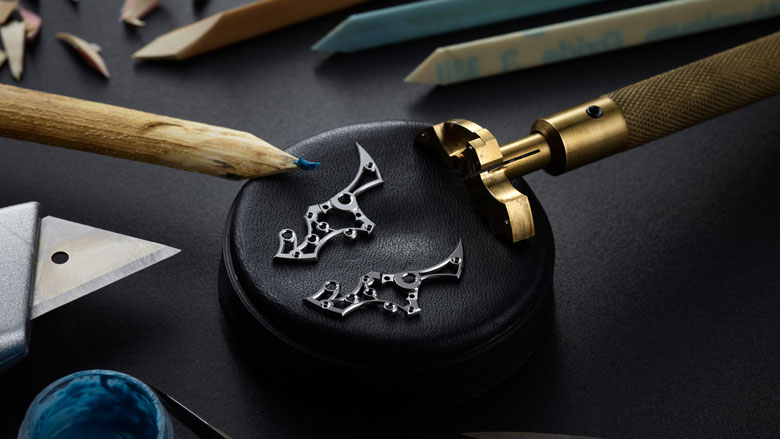
Sylvie concludes: “Performing the anglage for one Insight Micro-Rotor Squelette is a real test of mental stamina. For a month and a half, eight hours a day, you have to really be in the zone, concentrating so hard. It is like a marathon. You have to approach it angle by angle, component by component, until you finally reach the finish line and get that feeling of accomplishment.”
In addition to hand-polished bevels, customers can opt for matte-finished bevels on their Insight Micro-Rotor Squelette, giving a slightly more understated look. The latter removes the need for the hand-polishing stage, but still involves the steps of beveling, softening and smoothing by hand.
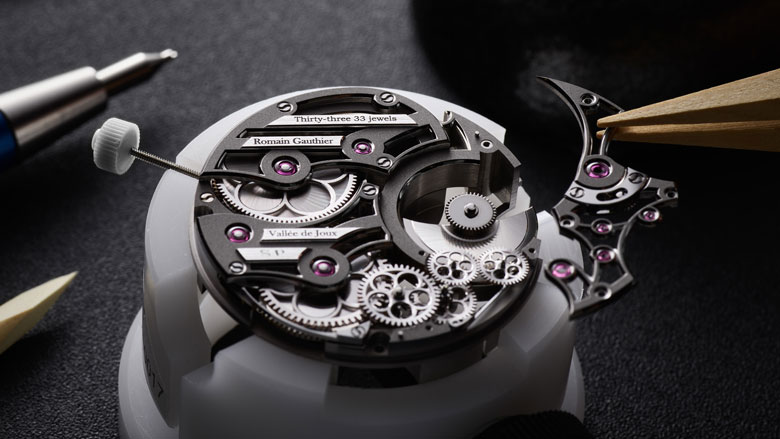
Raising the Bar: While the superlatively hand-finished, skeletonized mainplate and bridges of the Insight Micro-Rotor Squelette are a spectacle in themselves, opening up the caliber uncovers a raft of fresh details.
Between 1 o’clock and 3 o’clock, the winding and time-setting mechanisms are more visible with a cluster of Romain Gauthier S-slot screws on show. We can now see one of the mainspring barrels, decorated by snailing, at 5 o’clock and, at 7 o’clock, circular-grained gears with circular, beveled arms. The increased sense of depth created by this skeletonization makes the balance wheel at 6 o’clock appear as though it is floating, while the snailed micro-rotor at 9 o’clock sways more dramatically than ever between the stripped-down bridges.
The spectacle continues through the display back where the micro-rotor can be seen engaging the visible train of gears, beginning with the reversing gear that gives the mechanism its bidirectionality. The highly decorated barrels and ratchet wheels are now more exposed, while the sinuous shapes of the bridges are juxtaposed by the straight-grained, linear plaquettes adorning them.
“I feel that skeletonizing the Insight Micro-Rotor takes this caliber to a more technical level,” says Gauthier. “The wearer can marvel at the gears and other moving parts that are now on show and appreciate the architecture even more. Opening up the movement also creates more layers making it more three-dimensional. The result, for me, is a real contemporary skeleton watch.”
How to Order: Precious metal or titanium “Special Orders” are available through Cellini Jewelers.
Insight Micro-Rotor Squelette can be requested as a “Special Order” in a 39.5mm case made in precious metal or natural or black DLC titanium. To fuel our imaginations, Romain has created two Special Order examples.
One is in rose gold featuring an oven-fired black enamel dial greyed by hand-frosting with white and gilded dial accents, complemented by rose gold hands; mainplate and bridges beveled, softened and smoothed by hand, then matte-finished; and gilded micro-rotor, plaquettes and balance wheel. It is fitted with a grey, natural rubber strap with a rose gold pin buckle.
The other example is in platinum featuring an oven-fired, satin-blue enamel dial made in house by Romain’s wife Ana Gauthier, with white dial accents, accompanied by white gold hands; bridges and mainplate beveled, softened, smoothed and polished by hand; and rhodium-treated micro-rotor, plaquettes and balance wheel. It is accompanied by a navy-blue alligator leather strap with a white gold pin buckle.
Elements that collectors can customize include the material of the case; final finishing to the bridges and mainplate (hand-polished or matte-finished bevels); color of the dial and dial accents; material and color of the hands; color of the plaquettes and their engravings; and the material and color of the strap.
